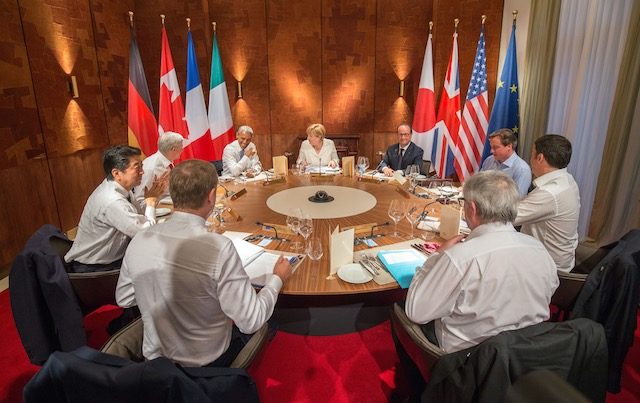SUMMARY
This is AI generated summarization, which may have errors. For context, always refer to the full article.

ELMAU CASTLE, Germany – World leaders at a G7 summit in Germany were on Monday, June 8, set to present a united front against global security threats ranging from jihadist insurgencies to what US President Barack Obama condemned as “Russian aggression in Ukraine”.
While excluding Russian President Vladimir Putin for a third time, the Group of Seven leaders have invited others beyond the club of rich nations, including Iraq’s premier and Nigeria’s president, who are both battling deadly Islamist violence.
Iraq’s Prime Minister Haider al-Abadi was scheduled to discuss the US-led campaign to help his country battle the Islamic State (ISIS) group who launched a lightning offensive a year ago and have snatched over a third of the country’s territory.
Abadi will also get one-on-one time with Obama to discuss the Washington-led campaign to help Baghdad recover territory lost to Islamic State militants, whose self-proclaimed “caliphate” extends deep into neighboring Syria.
The power summit, held in a tightly-secured resort in the Bavarian Alps, was also expected to hold talks on “foreign fighters” and the threat Islamist extremism poses to their countries – Britain, Canada, France, Germany, Italy, Japan and the United States.
Another visitor to the summit, Nigeria’s newly-elected President Muhammadu Buhari, was to put a “shopping list” to the G7 leaders, seeking help to fight an insurgency by Boko Haram Islamists blamed for 15,000 deaths since 2009.
Buhari has been tested with 11 separate attacks that have left at least 93 dead in the week he has been in the job.
Sanctions against Russia
The first day of the G7 was dominated by the Ukraine conflict, as Obama and the summit host, Chancellor Angela Merkel, urged the global community to stand firm against Moscow until it complies with a Ukraine ceasefire deal struck in the Belarussian capital Minsk.
“I expect that we should send a firm signal here. Not sanctions as an end to itself, but sanctions… to reach a target,” Merkel told ZDF television.
Japan’s Prime Minister Shinzo Abe and Canada’s Stephen Harper on Saturday, June 6, made a point of visiting Kiev on their way to the summit, to voice support for Ukraine’s embattled leaders, as a recent flare-up in fighting in the east has left at least 28 dead.
Although Putin has insisted that “there’s no need to be afraid of Russia”, the latest escalation has sparked fears that the hard-won ceasefire brokered by France and Germany four months ago could be derailed.
Another pressing problem has been the haggling between debt-hit Greece and its international creditors – the EU, ECB and IMF – and the fear that a messy default could lead to Greece exiting the eurozone, with unknown repercussions for the world economy.
The issue was expected to arise again when the G7 leaders meet another guest in their “outreach talks” Monday, the International Monetary Fund’s chief Christine Lagarde.
Climate change, China’s ambitions
Merkel and French President Francois Hollande, meanwhile, were expected to seek consensus with G7 counterparts on another burning issue threatening the world, climate change, ahead of a year-end United Nations summit in Paris.
The aim is to send a clear signal to push other nations participating in the Paris summit to commit to reducing dangerous greenhouse gas emissions, which threaten to melt ice caps and glaciers, raise sea levels and bring more violent storms and floods.
“I think we will arrive at obtaining something satisfactory – both in terms of G7 engagements on ambitious targets and in terms of engaging on participation in financing,” said a French official.
Abe was expected to draw attention to a pressing regional issue – China’s assertions over most of the disputed South China Sea, where its territorial claims clash with those of several other nations.
Alarm is growing in Asia over Beijing’s reclamation works in the sea, and the United States has said China’s actions were “out of step” with international norms.
Citing unnamed sources, Japan’s Yomiuri newspaper said the G7 would in their joint statement closing the summit express concern about unilateral attempts to change the status quo in the South China Sea, while no country would be named in the communique.
Ahead of the summit, G7 foreign ministers in April said the situation in the East and South China Seas was of concern, particularly “any unilateral actions, such as large scale land reclamation, which change the status quo and increase tensions”. – Hui Min Neo, AFP / Rappler.com
Add a comment
How does this make you feel?
There are no comments yet. Add your comment to start the conversation.